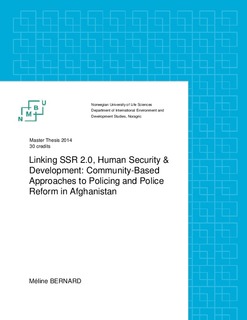| dc.contributor.author | Bernard, Meline | |
| dc.date.accessioned | 2014-11-05T10:38:20Z | |
| dc.date.available | 2014-11-05T10:38:20Z | |
| dc.date.copyright | 2014 | |
| dc.date.issued | 2014-11-05 | |
| dc.identifier.uri | http://hdl.handle.net/11250/225357 | |
| dc.description.abstract | The thesis presents the results of an exploratory study of perceptions which examines the debate over community-based approaches to policing in Afghanistan. Putting the security of the Afghan people rather than that of the Afghan state at the centre of the study according to a human security approach, it attempts to explain how Security Sector Reform (SSR) and police reform embedded in an international statebuilding project are envisioned by some in a developmental perspective. To do so, it engages with the recent history and developments of civilian approaches to police reform in light of four normative dimensions of SSR, namely people-centrism, democratic accountability and oversight, civilianization and civil society engagement. It focuses on the case study of a few community-based policing pilot projects and argues that their models, in the ways they revisit these key principles of SSR, sketch the guidelines of an updated form of Afghan SSR 2.0 putting greater emphasis on building a humane, accountable and responsible police beyond the basic building of a „trained and equipped‟ police. It argues further that, despite internal tensions and external challenges, these models show definite potential for modeling revised police governance and SSR 2.0 along a path towards greater police civilianization taking into account the initiatives of bottom-level actors. It concludes that such potential can be exploited, provided these initiatives and actors are taken on board seriously in police reform and the creation of feedback mechanisms between the top and the bottom is made a normative priority on the international SSR and police reform agenda. The study is based on the qualitative analysis of over 50 individual and group interviews with development and security actors conducted in October and November 2013 in Kabul, Herat and Faryab provinces in Afghanistan. | nb_NO |
| dc.language.iso | eng | nb_NO |
| dc.publisher | Norwegian University of Life Sciences, Ås | |
| dc.rights | Attribution-NonCommercial-NoDerivs 3.0 Norway | * |
| dc.rights.uri | http://creativecommons.org/licenses/by-nc-nd/3.0/no/ | * |
| dc.subject | Security Sector Reform | nb_NO |
| dc.subject | police reform | nb_NO |
| dc.subject | policing | nb_NO |
| dc.subject | civilianization | nb_NO |
| dc.subject | community policing | nb_NO |
| dc.subject | Afghanistan | nb_NO |
| dc.title | Linking SSR 2.0, human security & development : community-based approaches to policing and police reform in Afghanistan | nb_NO |
| dc.type | Master thesis | nb_NO |
| dc.subject.nsi | VDP::Social science: 200::Political science and organizational theory: 240 | nb_NO |
| dc.source.pagenumber | 150 | nb_NO |
| dc.description.localcode | M-IES | nb_NO |

